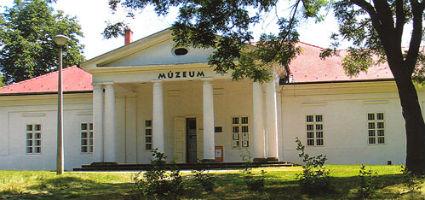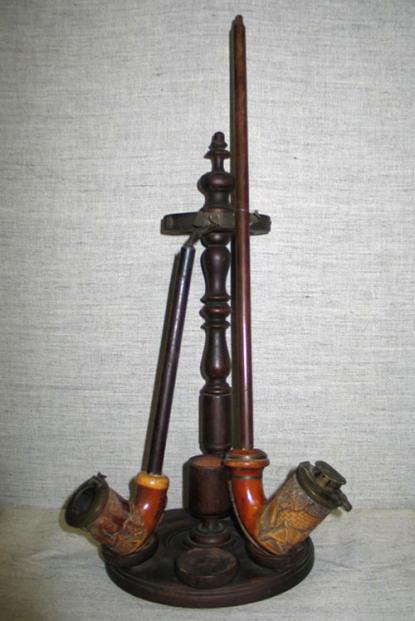2025. August 2. Saturday
Pál Kiss Museum - Tiszafüred
 |
Address: 5350, Tiszafüred Tariczky sétány 6.
Phone number: (59) 352-106
E-mail: kisspalmuz@gmail.com
Opening hours: Tue-Sat 9-12, 13-17
|
The exhibition has closed for visitors.
2008.04.01. - 2008.04.30.
Museum tickets, service costs:
|
Ticket for adults
|
500 HUF
|
/ capita
|
|
Group ticket for adults
(min. 10 people)
|
150 HUF
|
/ capita
|
|
Ticket for students
|
250 HUF
|
/ capita
|
|
Ticket for pensioners
|
250 HUF
|
/ capita
|
|
Ticket for families
(2 adults + max. 3 children)
|
750 HUF
|
/ family
|
|
Program ticket
|
300 HUF
|
/ capita
|
|
Season ticket
|
1000 HUF
|
|
|
Group guide
(max. 40 people)
|
2000 HUF
|
/ group
|
|
Photography
|
1000 HUF
|
|
|
Video
|
1000 HUF
|
There is a pipe-stand ("pipatórium") in the collection of our museum, used for standing nice, well-carved pipes in it. In the 19th century noblemen had several nice, well-prepared, carved pipes and we have a few of these pipes in our collection.
 These two pipes displayed in our exhibition were carved from pumice-stone. They were white but had become brown as a consequence of using.
These two pipes displayed in our exhibition were carved from pumice-stone. They were white but had become brown as a consequence of using.
Pipe numbered 70. 142.1. has got a long stem and a copper cap. There is fenwork on it with a deer-like animal and dated 1810. The stem of this pipe is 46 centimeter long and it is carved of sour cherry tree. This long stem permitted of easy pipe.
The other pipe with number 70. 143.1. hasn't got a cap. There is a frenwork displaying a gallopping horse and a carved date is 1850 on it. Its stem is shorter.
Both pipes were carved of pumice-stone, namely frenwork was done on them. Punice-stone said to be similar to ivory-bone and can be easy carved and sculptured. Doing frenwork was a spetial handicraft at the end of 18th century and at the beginning of 19th century. Making pumice-stones needed the cooperation of different handicrafts: caps were made by braziers, stems were made by mouthpiece-makers. Smoking with pipes was most favoured between 1825 and 1848 in the period called "age of reform" in Hungarian history as it become the symbol of contry-side life-style for a nobleman of that time.
Pipe made of pumice-stone could be easily broken. That is why they are cracked and mended with copper wire.
Translated by István, Vadász
 These two pipes displayed in our exhibition were carved from pumice-stone. They were white but had become brown as a consequence of using.
These two pipes displayed in our exhibition were carved from pumice-stone. They were white but had become brown as a consequence of using.Pipe numbered 70. 142.1. has got a long stem and a copper cap. There is fenwork on it with a deer-like animal and dated 1810. The stem of this pipe is 46 centimeter long and it is carved of sour cherry tree. This long stem permitted of easy pipe.
The other pipe with number 70. 143.1. hasn't got a cap. There is a frenwork displaying a gallopping horse and a carved date is 1850 on it. Its stem is shorter.
Both pipes were carved of pumice-stone, namely frenwork was done on them. Punice-stone said to be similar to ivory-bone and can be easy carved and sculptured. Doing frenwork was a spetial handicraft at the end of 18th century and at the beginning of 19th century. Making pumice-stones needed the cooperation of different handicrafts: caps were made by braziers, stems were made by mouthpiece-makers. Smoking with pipes was most favoured between 1825 and 1848 in the period called "age of reform" in Hungarian history as it become the symbol of contry-side life-style for a nobleman of that time.
Pipe made of pumice-stone could be easily broken. That is why they are cracked and mended with copper wire.
Translated by István, Vadász
